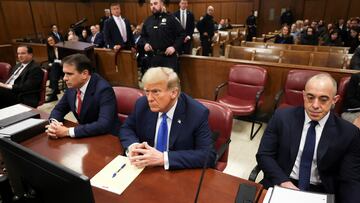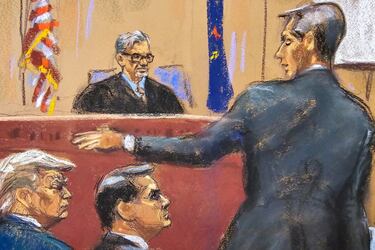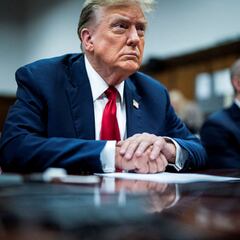What do jurors in Trump’s hush-money trial think of the former president?
The jury requires privacy as they see evidence and hear testimony during Donald Trump’s ‘hush money’ trial... What we know about their views of the former president.


Oral arguments are underway in the criminal trial surrounding an alleged hush money payment made to adult film actress Stephanie Clifford, professionally known as Stormy Daniels, on behalf of Donald Trump. Prosecutors believe the $130,000 payment was made during the 2016 presidential campaign to keep Ms. Clifford quiet about an affair between her and the former presidnet in 2006. While making payments of this nature is not illegal, it is when camping funds are used to do so. Michael Cohen, Donald Trump’s former lawyer who landed in some hot water of his own, is accused of making the payment and is expected to testify during the trial.
Prosecutor Matthew Colangelo told the jury that Michael Cohen's testimony will be backed up by emails, text messages, phone logs, and business documents.
— Kyle Griffin (@kylegriffin1) April 22, 2024
"And it will be backed up by Donald Trump’s own words on tape, in social media posts, in his own books, and in videos of his…
Selecting a group of twelve US citizens who believe they can be impartial in a case would be hard enough... Doing so in Manhattan, a New York City borough where the former president only received 12.3 percent of the vote in 2020, was even more challenging. However, a week after jury selection began, the twelve individuals took their seats and listened to oral arguments as the trial got underway.
The need to protect the privacy of the jury
Very little is known about the identities of the jurors.
During the trial, it will be critical that the jurors have their privacy and feel that they can freely decide whether the president is innocent or guilty based on the evidence and testimony they see and hear in court. If their identities were to become known, they could be harassed and they could be propositioned to take a bribe that favors one side or ther other. To ensure the safety of the jurors and to, as best as possible, protect Donald Trump’s right to a fair trial, safeguarding the privacy of the jury is critical. Before oral argumetns began, one juror recused herself after her participation became public, and she began to receive questions from those close to her life. Jurors are not supposed to talk about the case outside of the courtroom or the room where the members will be sent to deliberate to prevent any biases from surfacing. In that vein, we will not be discussing the individual characteristics of the jurrors, but rather talk about the group more broadly, based on what has been reported on their views, interests, and background.

What we know about the group
Related stories
In the United States, a jury determines if a party is innocent or guilty. The prosecution and the defense worked together to identify the members, meaning those selected had to speak to their political perspectives and, in many cases, their opinions of the former president in open court. Those who believed they could not be impartial in a case involving Donald Trump were asked to leave early.
Another group, some of which made it onto the jury, were frank about their opposition to Donald Trump’s politics, but beleived that they could still remain impartial in completing their civic duty. Based on the news digest of the jury’s members, it also appears that many do not follow politics very closely, which could indicate that they have a less polarized view of the former head of state. The news outlets most followed by the gorup included the New York Times and the Wall Street Journal. Some were also watchers of CNN and Fox News, and others received much of their news from social media platforms, including Tik Tok.


Complete your personal details to comment